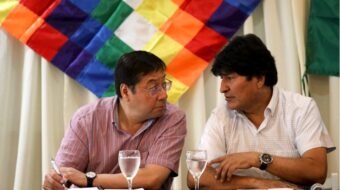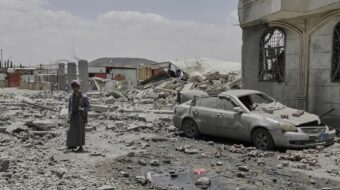Translated from Mexico City-based La Jornada by Emile Schepers
LA PAZ — Jimmy Carter, the former president of the United States and Nobel Peace Prize winner, denounced on May 2 separatist movements in Bolivia. He anticipated that Washington would not recognize separatist actions against the democratic government in the South American country, during a tour through the region.
“I have also observed that there are groups that want to have the country divided, not united. I am convinced that the United States is going to absolutely oppose any separatist movement” said the former head of state (1977-1981) at a press conference accompanied by the Bolivian president.
The Bolivian government on April 16 denounced a plan to divide Bolivia with “the independence” of the province of Santa Cruz, the most prosperous one because of its fertile lands and natural resources such as petroleum, iron and minerals, which is governed by right-wing forces who have headed a strong pro-autonomy movement along with three other regions.
Three Europeans were then killed in Santa Cruz in an anti-terrorist operation and two others were arrested. The five are accused of developing a plan to assassinate Morales and obtain “independence” for Santa Cruz, which ended up with a series of rebellions by autonomous regions against the central government.
Carter, accompanied by his wife Roselyn and members of the Carter Center, today visited the Quemado Palace to carry out a private meeting with Morales. They both maintain a relationship going back many years. “We met several times, but ex-President Carter did not want photos of the meetings” the Bolivian said.
Carter promised to return to Bolivia for the general elections in December. “I am sure that the elections are going to be the clearest expression of the will of the people” he said.
He also accepted the invitation by Morales to visit the coca-leaf growing area in Cochabamba, in the center of Bolivia.
“I will come and I will harvest coca (leaf) just as President Morales came and harvested peanuts in Georgia,’ agreed Carter, smiling.
Replacing ambassadors
Morales and the Nobel Prize winner expressed agreement, separately, that Bolivia and the United States return their ambassadors in La Paz and Washington. The relationship deteriorated because of the closeness of the U.S. embassy to the right wing opposition.
It was thus that Bolivia in September of last year expelled the U.S. ambassador Philip Goldberg for presumed interference in political matters and for supporting actions against his government.
The United States responded with the expulsion of the Bolivian ambassador Gustavo Guzman.
But the differences continued with the expulsion by La Paz of the DEA and the U.S. Agency for International development who were working in the Cochabamba coca producing region.
Nevertheless, Morales asserted today that his government had not expelled the members of the U.S. Peace Corps program and suggested the possibility that they come back to Bolivia to [work on] anti-poverty projects.
He clarified their departure in September came after he reported that personnel of the volunteer organization reported that the U.S. embassy had asked them to spy on Venezuelans and Cubans who were working on health and education projects in Bolivia.
The visit of the U.S. ex president to Bolivia concluded with a meeting with leaders of the opposition in Santa Cruz de la Sierra, before going to Brazil.
Meanwhile Morales designated Roxana Ibarnegary as the new president of the National Electoral Court, hours after the resignation, for family reasons, of her predecessor Jose Luis Exeni.
Sources: La Jornada, Prensa Latina, Agence-France-Presse and Deutsche Presse Argentu.









